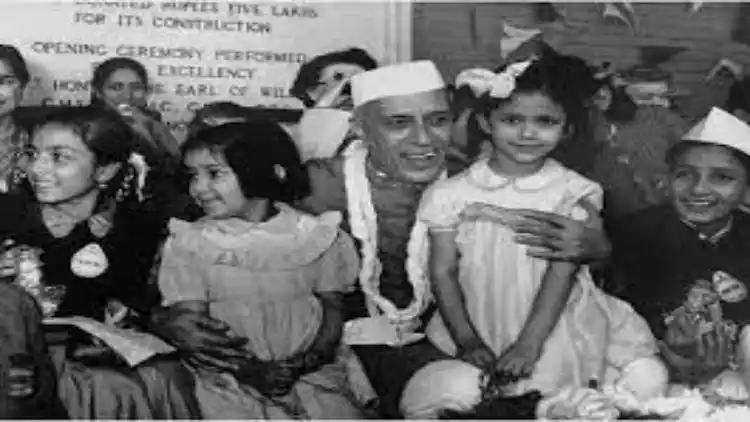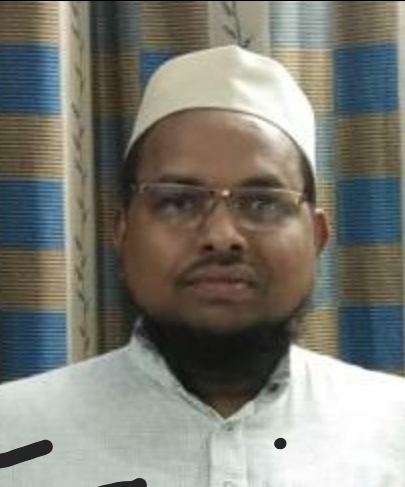
 Obaidur Rahman Nadwi
Obaidur Rahman Nadwi
Jawaharlal Nehru, the first Prime Minister of India, was also the architect of India’s Foreign Policy. In 1950 under his leadership India’s Five Year Plan was launched. The country made great strides in the field of science and technology. His life is an open book and he dedicated it to the service of the nation.
Born rich Nehru lived like an ordinary man. He loved children from the core of his heart. After Nehru died in 1964, it was unanimously decided to celebrate his birthday, 14 November, as Children’s Day. For his love of children, he is fondly remembered as Chacha Nehru. He wished to bring up children as useful citizens; their company gave him solace and comfort. He knew their nature, feelings, psychology, mood, and attitude.
In the children’s Special Number of Shankar’s Weekly (3.12.1949), he expressed his affection for children thus: “I like to be with the children, to talk to them and all the more to play with them. In their company for a while forget that am so old and that was a child long, long ago.”
“If you (the children) were with me, I would love to talk to you about this beautiful world of ours, about flowers, about birds and animals, about mountains and glaciers, and about all the other wonderful things our world is bestowed with. You know, so much beauty is perceptible all around us yet grown-up people like me often remain unaware about it and, engrossed in the office routine, think they are doing some very important work. I hope you would be wiser and keep your eyes open and ears open towards the beautiful life around you.”
Late President Dr. Zakir Husain has quoted: “If you were with me,” Jawaharlal Nehru writes in one of his letters to the children of India, “I would love to talk to you about this beautiful world of ours, about flowers and trees and birds and animals and stars and mountains and glaciers and all the other wonderful things that surround us........ You must have read many fairy tales and stories of long ago. But the world itself is the greatest fairy tale and story of adventure that has been written. Only we must have eyes to see and ears to hear and a mind that opens out to the life and beauty of the world.”
Jawaharlal Nehru is no longer here to talk to children: his message has to be carried to them so that they open out their minds to life and beauty.
Zakir Husain further says: “He loved children and flowers and birds, but his love of friendship and peace among men and nations was deeper still because that was for him the most beautiful and desirable of all things. It was to this that he dedicated all his thought and energy, and he did it with a smile that has become a part of our history.”
His father Motilal Nehru, was a well-known lawyer of Allahabad. He wanted Jawaharlal to be educated in England. So he got him admitted to the famous public school at Harrow. Then he joined Trinity College, Cambridge from where he took his degree with honours in Natural Science.
Later on, he joined the Bar in the Inner Temple, London, and got through the Bar examination easily. In the autumn of 1912, he returned to India after seven years in England.
In India, he devoted himself to the cause of his motherland. He played a very significant role in the national struggle for freedom. He was arrested many times and spent many years of his life in prison. He was in various prisons - at Naini, Bareilly, Dehradun, Almora, Alipore in Calcutta, and Ahmednagar. India attained freedom on August 15, 1947, and he became the first Prime Minister of free India. He was in office from 1947 to 1964.
He first met Mahatma Gandhi in 1916 during the Lucknow Congress session. Since then both worked together for the sake of the country.
Jawaharlal Nehru was a great writer. He was considered one of the finest writers of English. He did his best writing in prison. He had time and his mind had some rest there. From 1931to 1933, he wrote letters from time to time to his little daughter, Indira. These were on history, from the beginning till modern times. Jawaharlal wrote mainly from memory but he seemed to remember everything. He wrote of the civilizations, the revolutions which had changed the course of history, and the social and economic problems of the world. The letters were later published in the form of a book called Glimpses of World History. It is one of the finest accounts of the histories of the world in one book.
Jawaharlal also wrote An Autobiography in prison between June 1934 and February 1935 and was published in 1936 in England. It became famous immediately. It was sold and read widely. The author’s frankness and charm impressed the world. At times it reads like poetry. Jawaharlal wrote the book at a difficult period in his life when his mind was troubled and he had many doubts. He criticized Gandhi and others freely. But he wrote honestly and with modesty and he put himself many questions. It was both an account of him and a history of times. It is one of the best autobiographies.
Jawaharlal was imprisoned in Ahmadnagar Fort in 1942 and stayed there for nearly three years. There he wrote The Discovery of India. This also became a famous book. It deals with India's long past, the problems of the present, and gives a glimpse of the future. It is living history. The past comes back to life in Jawaharlal's pages. He had traveled widely in the country and he knew the different people of the different parts very well. He realized how diverse they were; the book shows his great love for them.
Jawaharlal's life in prison was not wasted. He made the best use of his time. He wrote three great books while he was in prison".(Nehru for Children by M.Chalapathi Rau, page,48-49.)Indira Gandhi says, “My father’s three books, Glimpses of World History, An Autobiography and The Discovery of India, have been my companions throughout my life. It is difficult to be detached about them”. (Glimpses of World History)
The most striking aspect of his life was the habit of working very hard for long hours. He told the people again and again that they were sentenced to hard labour to build their country. “Aaram Haram Hai”.(Rest is not proper), he often said. Even when he was ill, he thought of nothing but working for his country.
He once said: ‘There is one ambition left in me: that in the few years left to me, I should throw myself, with all the strength and energy left in me, into the work of building up India. I want to do it to the uttermost, till I am exhausted and thrown away as on the scrap-heap. I am not interested in what you or anybody thinks of me afterward. It is enough for me that I have exhausted myself, my strength and energy, in India’s task.’
He wrote on his writing pad the following lines from a poem by the American poet, Robert Frost:
The woods are lovely, dark, and deep, But I have promises to keep
And miles to go before I sleep, And miles to go before I sleep.
He kept these lines in mind till the last hours of his life.
Apart from never wasting time, Nehru did physical exercise daily. The habit remained with him throughout his life.
Children can imbibe a lot from Nehru’s life. His life is a role model for them. They should follow him in letter and spirit.
Journalist M. Chalapathi Rau has rightly said: “Jawaharlal needs no memorial. The whole of modern India is a memorial to him. The story of his life will be told and retold. It is the story of a brave, hard-working, and chivalrous man, who loved his people with all his mind and heart, who worked for them till the end of his life, and who built a hopeful future for them. They cannot forget him. And they know they must carry on his work.”
(Dr. Obaidur Rahman Nadwi is Faculty Member, Darul Uloom Nadwatul Ulama, Lucknow)
